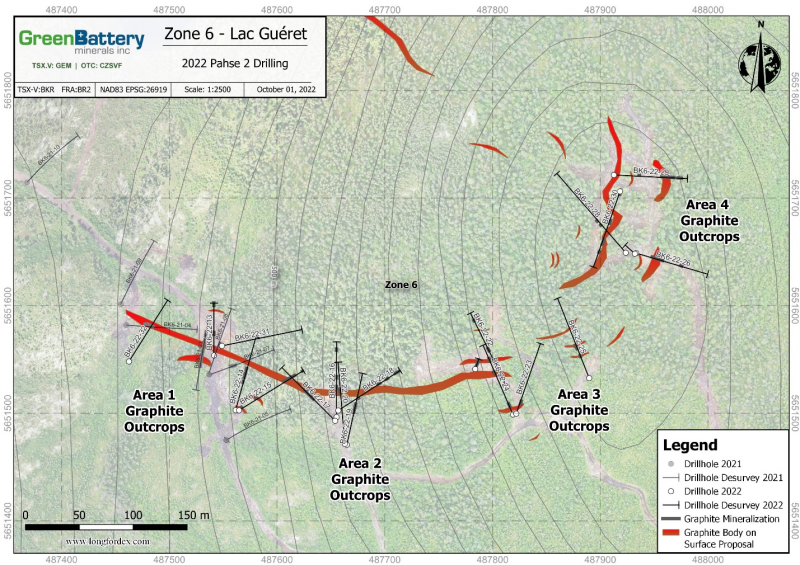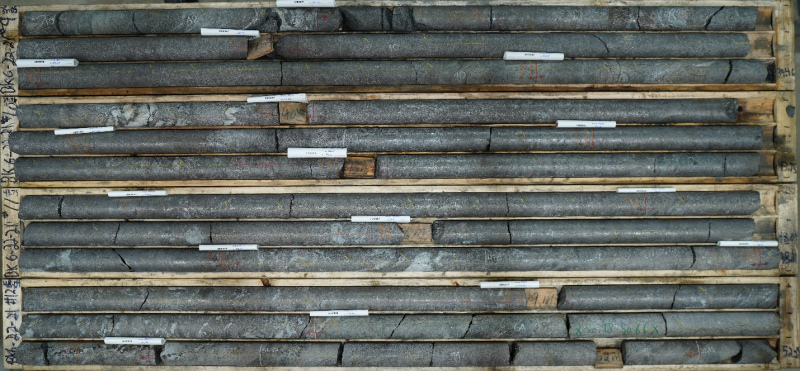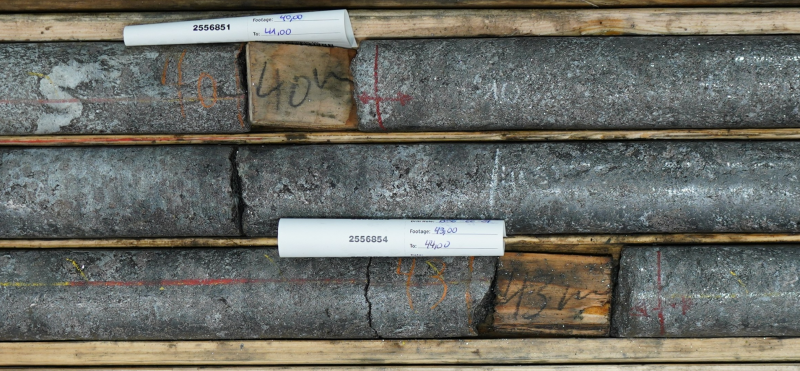(TheNewswire)
VANCOUVER, BRITISH COLUMBIA – TheNewswire - Vancouver, British Columbia, | Oct. 6th, 2022 – Green Battery Minerals Inc. (the "Company") (TSXV:GEM), (FSE:BK2P), (WKN:A2QENP)(OTC:GBMIF) is pleased to provide initial results from twenty (20) diamond drill holes that were completed as part of the Company’s successful second phase of drilling on the newly discovered Zone 6 area at the Berkwood Graphite Project, situated 280 km north of Baie-Comeau, Quebec.
A total of 20 exploratory drill holes were completed for a total of 2,058m. Seven of the twenty holes intersected significant graphite enrichment contiguous with previous drill results, extending the initial strike length of the Graphite enrichment horizon to 350 m along the southern limb.
Highlights intersections from initial assay results:
Newly Staked Claims
Green Battery Minerals is also very pleased to announce it has acquired additional claims adjacent to the zone 6 area. In total 16 new claims amounting to 866 Ha was staked on behalf of Green Battery Minerals to cover additional prospective areas with geophysical anomalism surrounding the core of the claims at Zone 6.
Tom Yingling, President and CEO of Green Battery, states, “I am very pleased with these initial results to date. We were successful in intersecting Graphite in 18 of the 20 holes drilled. Initial results show the mineralization to be continuous along strike for a length of approximately 350 m (1,150 feet) so far, and still open.”
“The 2022 drill program at Zone 6 was an exploration program designed to discover and expand upon potential graphite resources, and better understand the geology that controls the graphite enrichment. Our goal is to add to the proven resource we already have on Zone 1 (see news release dated July 15th, 2019), and we plan to do so by continuing with step-out and infill drilling on both Zone 1 and Zone 6. I am pleased to say that the Company also has numerous other outcropping graphite zones sampled that we still need to drill. In addition, management is very pleased to have expanded zone 6 by adding the new contiguous claims.
Benchmark Minerals Intelligence, one of the world’s leading battery element resource sources, says the world will need an estimated 97 natural flake graphite mines to meet the required demand by 2035.”

Click Image To View Full Size
Figure 1: 2022 drillhole location plan and mapped/surface projected intersections of graphite enrichment at Zone 6.
The 2nd Phase of drilling was successful in delineating along strike continuation of graphite enrichment along the southern limb of the host antiform fold structure. Initial results show the mineralization to be continuous along strike for a length of approximately 350 m.
Approximately 100 narrow intersections of graphite enrichment (both massive and disseminated) were encountered in a total of 18 of the 20 holes completed. These intervals ranged in thickness from 0.5 to 4 m in length and often identified new (unknown) zones of graphite enrichment, of these a total of 24 were greater than 1 m with observed massive graphite enrichment.
Table 1: Summary of Zone 6 significant graphite enrichment intercepts.
|
HOLE-ID
|
FROM (m)
|
TO (m)
|
LENGTH
|
LITHOLOGY
|
|
(m)
|
|
BK6-22-13
|
30.43
|
33.55
|
3.12
|
massive graphite enrichment
|
|
BK6-22-14
|
54.66
|
57.41
|
2.75
|
massive graphite enrichment
|
|
BK6-22-17
|
44.36
|
47.9
|
3.54
|
massive graphite enrichment
|
|
BK6-22-17
|
53.14
|
61.73
|
8.59
|
massive graphite enrichment
|
|
BK6-22-19
|
58.9
|
61.13
|
2.23
|
massive graphite enrichment
|
|
BK6-22-21
|
35.65
|
52.15
|
16.5
|
massive graphite enrichment
|
|
BK6-22-22
|
16.1
|
17.7
|
1.6
|
massive graphite enrichment
|
The above intervals are drilling lengths, not true widths, because the true orientation of the enrichment horizons has not yet been established.
The 2022 drilling focused on the outcrops 1 to 3 along the southern limb, and outcrop 4 at the ‘fold nose’ area. Intersections in holes 32 and 13 successfully extended the westward strike of graphite enrichment by approximately 100 m – open to the west. Intersections in holes 14, 15, 17, 16, 20, and 18, extended the enriched horizon to the east connecting it with the Outcrop 3 area, where the thickest intersection were encountered in hole 21. Additional intersections in the neighbouring holes 22, and 24 appear to show local folding and replication of the enriched horizon within the antiform which hosts the graphite enriched horizon.
The results from the drilling show a complex fold interference pattern across the zone 6 area. The diamond drilling program was completed with oriented core allowing the collection important structural data to aid in interpretation of the spatial extent and controls on the enrichment horizon. Interpretations are currently underway to better understand the fold geometry at the zone 6 area, and to understand controls on localised replication of the enrichment horizon as identified at the outcrop 3 area.

Click Image To View Full Size

Click Image To View Full Size
Figure 2: Drill Core from BK-22-21, A) Graphite enriched zone from 35.6 to 52.2 (16.6m length), B) inset; a selected example of coarse flake graphite enrichment encountered between 40 – 43 m.
Drilling at the outcrop 4 area structure encountered numerous variably thick intersections of graphite enrichment where shallow dips exposed large areas of outcropping graphite at surface. Oriented core measurements are currently being interpreted to resolve the complex fold interference pattern which controls the spatial distribution of graphite enrichment at the nose of the antiform area.
Table 1: Summary of Phase 1 drill hole locations and down hole specifications.
|
HOLE-ID
|
EASTING
|
NORTHING
|
ELEVATION
|
LENGTH
|
AZIMUTH
|
DIP
|
|
(UTM NAD 83)
|
(UTM NAD 83)
|
(m AMSL)
|
(m)
|
(degree)
|
(degree)
|
|
BK6-22-13
|
487541.4
|
5651554
|
453.222
|
76
|
0 |
-50
|
|
BK6-22-14
|
487561.5
|
5651503
|
466.151
|
109
|
0 |
-60
|
|
BK6-22-15
|
487564.7
|
5651503
|
468.909
|
109
|
30
|
-50
|
|
BK6-22-16
|
487655.3
|
5651496
|
497.037
|
109
|
0 |
-50
|
|
BK6-22-17
|
487653.9
|
5651493
|
497.177
|
109
|
315
|
-50
|
|
BK6-22-18
|
487656.9
|
5651503
|
497.646
|
109
|
45
|
-50
|
|
BK6-22-19
|
487664.8
|
5651471
|
496.96
|
109
|
0 |
-50
|
|
BK6-22-20
|
487662.9
|
5651472
|
496.978
|
107
|
335
|
-45
|
|
BK6-22-21
|
487784
|
5651541
|
541.985
|
70
|
0 |
-90
|
|
BK6-22-22
|
487813.2
|
5651525
|
544.228
|
109
|
315
|
-50
|
|
BK6-22-23
|
487822.1
|
5651500
|
543.868
|
109
|
0 |
-50
|
|
BK6-22-24
|
487819
|
5651499
|
543.528
|
109
|
315
|
-50
|
|
BK6-22-25
|
487889.7
|
5651533
|
555.213
|
124
|
320
|
-50
|
|
BK6-22-26
|
487933.3
|
5651649
|
584.392
|
109
|
90
|
-50
|
|
BK6-22-27
|
487932.2
|
5651648
|
584.74
|
19
|
312
|
-50
|
|
BK6-22-28
|
487923.7
|
5651649
|
584.511
|
142
|
300
|
-45
|
|
BK6-22-29
|
487912.7
|
5651721
|
585.721
|
109
|
75
|
-45
|
|
BK6-22-30
|
487918.4
|
5651706
|
585.764
|
109
|
180
|
-45
|
|
BK6-22-31
|
487548.9
|
5651563
|
452.452
|
109
|
45
|
-45
|
|
BK6-22-32
|
487462.5
|
5651548
|
425.72
|
103
|
15
|
-50
|
QA / QC Comments
179 diamond drill core samples of sawn core have been collected from core lengths usually varying from 0.3 to 1.50 m depending upon geological and mineralogical constraints. Every tenth sample, a QAQC measure was entered in the sample submission in the order of standard-blank-standard-duplicate. The standard selected is OREAS 723; a certified reference material containing 5.87% TGC (Total Graphitic Carbon).
Samples were delivered to MSALABS in Langley, British Columbia, an ISO accredited laboratory. There they were crushed to a nominal minus 2 mm, split into representative sub-samples and then pulverized to at least 85% minus 75 microns before collecting sub-sample pulps for each of the core samples.
All sub-sample pulps were analysed for both Total Carbon + Total Sulphur (SPM-512) and Graphite Carbon (SPM-140). The Graphite Carbon analysis process involves the sample to be ashed, leached, and the residue measured by induction. The detection range for this analysis is between 0.02-50%, while the SPM-512 detection limit for both Carbon and Sulphur is 0.01-50%.
About the Berkwood Graphite Project
The Berkwood Graphite Project is located within the jurisdiction of Quebec, in the Manicouagan Regional County Municipality, three hours driving time from the city of Baie-Comeau. Easy access is provided via a major secondary road and numerous tertiary and forest roads that traverse the property.
The Zone 1 deposit lies 8 km southwest of Mason Graphite’s deposit which is the subject of a current feasibility study. The Company believes its Zone 1 deposit and that of Mason share many similar geological characteristics with the Zone 1 deposit being one of the highest-grade graphite deposits in the world.
The current mineral resource at the Berkwood Graphite Project includes in-pit constrained resource totalling 1,755,300 tonnes of indicated resources at 17.00 % Cgr and 1,526,400 tonnes in inferred resources at 16.39 % Cgr.
Table 2: In-pit Resource at Lac Gueret South Project (rounded numbers)

Click Image To View Full Size
The mineral resource estimates above are described in the technical report entitled, NI 43-101 Technical Report Mineral Resource Estimate on the Lac Gueret South Graphite Property, Quebec, Canada. With an Effective date of June 19th, 2019, dated June 30th, 2019, by Edward Lyons, PGeo., Florent Baril, ing., and Claude Duplessis, ing. Link to Report:
https://greenbatteryminerals.com/wp-content/uploads/ReportFINAL_compressed.pdf
Qualified Person: Luke van der Meer (P.Geo) is a Qualified Person (“QP”) as defined by National Instrument 43-101 guidelines, and he has reviewed and approved the technical content of this news release.
About the Company: Green Battery Minerals is managed by a team with over 150 years of collective experience with a proven track record of not just finding numerous mines but building and operating them as well. The Green Battery Minerals management team’s most recent success is discovering the Berkwood graphite deposit in Northern Québec. Green Battery Minerals owns 100% of this asset and the Company’s shareholders will benefit from this asset as the demand for graphite for electric vehicles increases significantly.
On Behalf of the Board of Directors
Green Battery Minerals lnc.
‘Thomas Yingling‘
President, CEO & Director
FOR MORE INFORMATION, PLEASE CONTACT:
Investor Relations:
or 1-604-343-7740
info@greenbatteryminerals.com www.greenbatteryminerals.com
Disclaimer for Forward-Looking Information:
Certain statements in this document which are not purely historical are forward-looking statements, including any statements regarding beliefs, plans, expectations or intentions regarding the future. Forward looking statements in this news release include that the Company will carry out the drill program described in this news release, conduct the Offering and expend funds on Berkwood Graphite Project exploration. It is important to note that the Company’s actual business outcomes and exploration results could differ materially from those in such forward-looking statements. Risks and uncertainties include that further permits may not be granted timely or at all; the mineral claims may prove to be unworthy of further expenditure; there may not be an economic mineral resource; methods we thought would be effective may not prove to be in practice or on our claims; economic, competitive, governmental, environmental and technological factors may affect the Company’s operations, markets, products and prices; our specific plans and timing drilling, field work and other plans may change; we may not have access to or be able to develop any minerals because of cost factors, type of terrain, or availability of equipment and technology; and we may also not raise sufficient funds to carry out our plans. Additional risk factors are discussed in the section entitled “Risk Factors” in the Company’s Management Discussion and Analysis for its recently completed fiscal period, which is available under Company’s SEDAR profile at www.sedar.com. No assurance can be given that any of the events anticipated by the forward-looking statements will occur or, if they do occur, what benefits the Company will obtain from them. These forward-looking statements reflect management’s current views and are based on certain expectations, estimates and assumptions, which may prove to be incorrect. Except as required by law, we will not update these forward-looking statement risk factors.
Neither TSX Venture Exchange nor its Regulation Services Provider (as that term is defined in the policies of the TSX Venture Exchange) accepts responsibility for the adequacy or accuracy of this release.
Copyright (c) 2022 TheNewswire - All rights reserved.